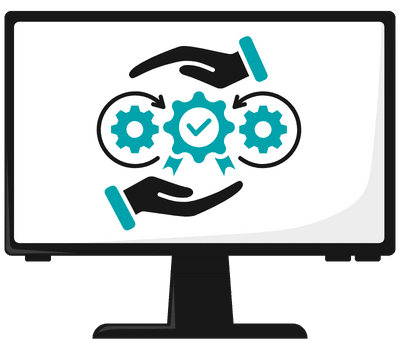
Managed IT Services for Small and Midsize Businesses
Request a consultation
Managed IT Solutions Your Business
Our Managed IT Services cover the essentials every business needs to stay productive and secure. From fast user support to infrastructure management and reliable backups, we give Phoenix-area businesses the tools and confidence to keep moving forward.
Help Desk Services
Your team deserves quick, reliable answers when technology gets in the way. Our Help Desk Services provide responsive business IT support for everything from software issues to device troubleshooting. With a local team that understands your environment, we resolve problems quickly so your employees can stay focused on what matters most − your customers.Explore furtherIT Infrastructure Support
Behind every strong business is a strong IT foundation. Our IT Infrastructure Support services include infrastructure management and infrastructure design to ensure your network, servers, and systems are reliable, secure, and ready to scale. We take a proactive approach, monitoring performance and addressing issues before they disrupt operations.Managed Backup Services
Your data is the backbone of your operations. Our Managed Backup Services protect your information with secure, automated backups and tested recovery plans. From compliance needs to disaster recovery, we give you peace of mind knowing your business can bounce back quickly if the unexpected happens.Explore further
Our Approach to Managed IT Services
At thirtyone3 technology, we believe Managed IT Services should go beyond quick fixes. Our approach is proactive, strategic, and centered on helping businesses stay productive, secure, and competitive. We focus on preventing problems before they disrupt your operations because downtime isn’t just inconvenient, it impacts your bottom line.
We believe the best IT issue is the one that never happens.
Instead of waiting for issues to slow you down, our proactive IT management keeps your business running smoothly. We deliver continuous monitoring, timely updates, and preventive maintenance that minimize downtime and interruptions. You get technology that supports growth without getting in the way.


Industries We Serve
Every industry has unique IT needs. thirtyone3 technology tailors our managed IT support to meet them. Whether it’s keeping healthcare data secure, ensuring reliable uptime for financial services, or scaling IT for growing professional firms, we bring the right expertise to each environment.
Locations We Serve
Based in the Phoenix Metro Area, thirtyone3 technology proudly provides business IT support to clients across the Valley. From downtown Phoenix to Scottsdale, Mesa, and beyond, our team understands the unique challenges local businesses face.
We’re committed to being more than an IT provider; we’re your local partner for smarter, more secure technology.

Why Small & Midsize Businesses Trust thirtyone3 technology with Their Managed IT Services
Choosing the right managed IT support partner can make all the difference for your business. thirtyone3 technology is trusted across the Phoenix Metro Area because we combine technical expertise with a personal, client-first approach. Our IT management services are designed to simplify your technology while strengthening your business.
Reliable Support, When You Need It
Our help desk and onsite technicians deliver fast, dependable service to keep your business running without disruption. You’ll never feel left on your own when challenges arise.Proactive IT Management
We don’t just fix problems − we prevent them. From business IT support to long-term planning, our comprehensive IT management services cover everything from infrastructure monitoring to backups and compliance. By keeping your IT one step ahead, we minimize risks and ensure downtime never gets in the way of your business.Local Expertise, Personal Connection
As a Phoenix-based IT services provider, we understand the unique needs of Valley businesses. We’re part of the community and committed to building long-term relationships with our clients, not just delivering one-time fixes.
Request a consultation
Managed IT Services FAQs
Have questions about Managed IT Services and how they can benefit your business? You’re not alone. Many of our clients want to understand how services like IT infrastructure support, business IT support, and proactive monitoring actually work day-to-day.
Have more questions? Contact us
Managed IT services provide outsourced IT support and management, including system monitoring, maintenance, cybersecurity, and help desk support. By partnering with a managed service provider (MSP), businesses reduce downtime, improve network security, and align technology with long-term goals. This proactive approach helps companies operate more efficiently, securely, and cost-effectively.
Explore Our IT Services
Your business deserves technology that supports growth, productivity, and security every day. Built on a foundation of managed IT services, thirtyone3 technology delivers a full range of solutions. From proactive IT support to advanced security and cloud management, your team always has the right tools in place.
View all managed IT & security services

Read Our Latest Managed IT Insights
View all insights

July 30, 2025
Managed IT Services
7 Reasons to Outsource Your IT Department
From 24/7 support to better cybersecurity, outsourcing your IT team offers more than cost savings, it gives your business the freedom to grow.
Read now

July 2, 2025
Managed IT Services
IT Planning for Q3: Projects to Prioritize Now
Learn why mid-year IT planning matters and discover the key IT projects your business should prioritize in Q3 to close out the year with confidence.
Read now

May 27, 2025
Managed IT Services
Why MSPs Are a Smart Investment for Tribal Nations
Discover how tribal managed security services help protect sovereignty, streamline compliance, and modernize infrastructure; without the burden of in-house cybersecurity staffing.
Read now

Partner with IT You Can Count On
Your business goals deserve technology that works as hard as you do. At thirtyone3 technology, our managed IT services are designed to remove roadblocks, strengthen security, and support growth; so you always feel confident about the future.
Request a consultation


